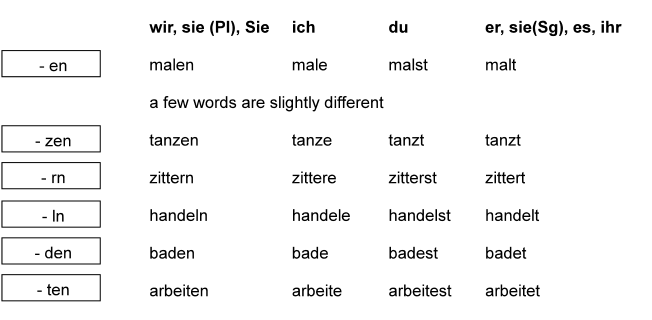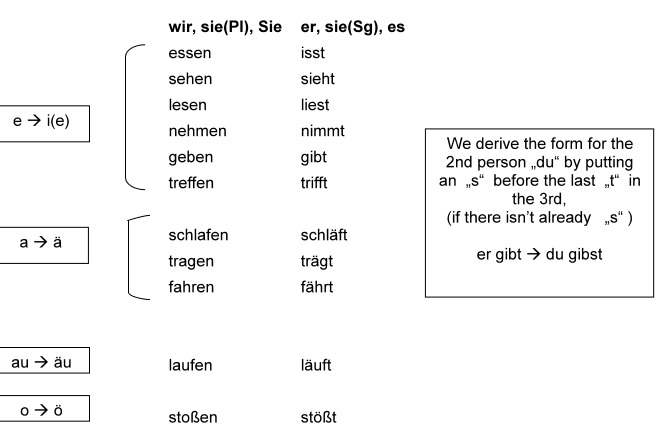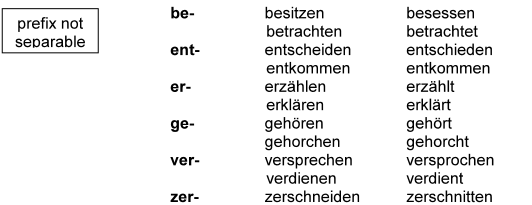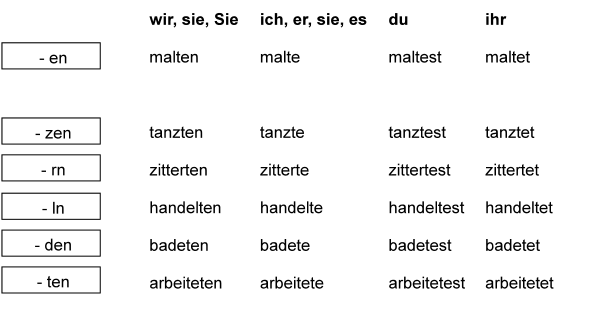conjugation means to put verbs in the correct form
For example in English we put an 's' at the end if the
subject is in 3rd person singular.
see - sees, go - goes sleep - sleeps etc.
Imagine someone saying: 'I goes to town.' Would you
understand him? It's more likely that you would correct him,
because the form of the verb 'to go' is wrong.
That's what it's all about and in German (as in most
languages) there's a little more to consider than just the 's'.
Here come the rules corresponding with the exercise you
chose above.
to top
regular conjugation in German
This type of verbs is usually called "schwache Verben" .
The first group ending on -en is the majority, more than 90% of german verbs have to be conjugated this way.
Notice: 1st and 3rd person plural are equal and 3rd singular and 2nd plural are equal.

to top
irregular conjugation in German
This type of verbs is usually called "starke Verben" .
A small but very important group.
What is so different with these verbs? The vowel changes in
the 2nd and 3rd person singular (all other forms are
regular)

notice:
irregular verbs ending on '–ten', don’t get an extra '–et' (different from regular verbs)

to top
verbs in this exercise are
conjugated regularly or irregularly
You need to know whether the verb is regular or irregular.
to top
reflexive verbs in German
Reflexive means: The verb comes always with the reflexive
pronoun of the subject. Normally it's the accusative
pronoun, but there are also some which come with the dative
pronoun.
The verb itself is conjugated the same way as shown above.
It might be regular or irregular. The difference to non
reflexive verbs is the pronoun in the right column
In German we often use reflexive verbs.
reflexive pronouns accusative

The reflexive pronoun dative differs only in the 1st
and 2nd person singular.

to top
separable verbs in German
Separable verbs are in fact a challenge.
They consist of a combination of a prefix (a preposition)
and a verb.
Just to give you an idea of how important they are, here
comes a table which shows some verbs and their combination
with a prefix. Some of this new formed verbs change their
meaning completely as for example 'aufhören' which means
'to stop doing something', but normally the meaning is closely related to the non separable form.

This list is not complete. Other separable prefixes are: "bei-, ein-, gegen-, fern-, über-, unter-, um-
Separable verbs can be regular or irregular. The conjugation
is the same as in the exercises above. The difference to non
separable verbs is that the prefix has to be at the end of the
sentence if it's the conjugated verb in a main clause.
It's not
separated
a) if it's in a secondary clause or
b) if it's the non
finite part in a complex predicate.
To illustrate the rule, let us compare.
In a main clause the verb is separated.
Er hört am Freitag um 6 Uhr
auf.
In a secondary clause the verb is not separated.
Ich habe gesagt, dass er am
Freitag um 6 Uhr aufhört.
As non finite part in a complex predicate the verb is not
separated.
Example in the future tense.
Er wird am Freitag um 6 Uhr
aufhören.
Example with a modal verb, which is very commonly used.
This is an example for what we practice in this exercises
Er möchte am Freitag um 6
Uhr aufhören.
to top
perfect with 'sein'
A significant difference is, that in German some verbs form
the perfect tense with the auxiliary verb 'sein'. The most
important verbs of this group are about 15 words, that describe a movement, like:
kommen, gehen, fahren,
laufen, rennen, bleiben, fliegen...
You have to learn them.
perfect tense with 'sein':
Er ist gekommen.
to top
How to form the participle
We have two groups:
a) participles with the added syllable 'ge'
b) participles without 'ge'
participles with an added 'ge'
put 'ge' before the 3rd person singular

With some verbs we just have to put 'ge' before the
infinitive form

but it's more efficient to learn the forms (as in English) than learning the rules. Here's a list with all forms.
put ge between the prefix and the
participle

participles without 'ge'
with verbs ending on ' -ieren' the participle is identical to the third person singular.

verbs with a prefix that is not separable don't get the
'ge'.

to top
German simple past tense, 'Präteritum'
How do we use the simple past tense?
There is no difference in meaning between the simple past tense and perfect tense in German.
Theoretically, you can speak proper German, without using the simple past tense. But the simple past tense is used and we can't ignore it. I'll try to set up an approximate rule that describes when we use what form.
We use the simple past tense
a) Always with the modal verbs and the auxiliary verb 'haben'. Although the modal verbs also have a form in the perfect tense, you almost never hear or read this form.
b) Very often with the auxiliary verbs ‘sein’ and ‘werden’.
"Ich war in Berlin." is equal to "Ich bin in Berlin gewesen."
"Ich wurde Lehrer." is equal to "Ich bin Lehrer geworden."
. . .
c) Often with some common verbs like "kommen, gehen, sehen". But this is very individual.
d) Mostly in novels, in newspapers, in stories. This is a question of style. Probably it is because the permanent repetition of the auxiliary verbs is very ugly.
The forms of the simple past tense
In the simple past tense, we have a third conjugation group besides regular and irregular verbs, named mixed conjugation. In this group are about 40 relevant verbs that are regular in present tense but irregular in simple past tense. The forms are sometimes very special. That's why we have to learn each of them.
irregular and mixed:Please open this
list with all forms.
regular: all regular verbs get the following endings.
Notice that 1st and 3rd person in both singular and plural are equal!.

to top













